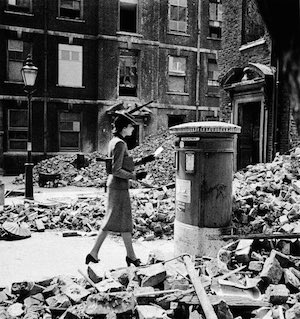
It’s difficult to concentrate on intellectual work in the midst of political upheaval, partly because you’re not sure that you ought to be concentrating. Maybe ideas have become a luxury or a distraction? The dilemma is nicely captured by the image on the right, circulating on Twitter under Briallen Hopper’s caption, “What writing feels like now.”
Despite the title of this post, Americans are not actually confronting “Life During Wartime.” But we are living through a painful political transition — from the administration of a President who spoke eloquently about the responsibilities of self-government, to a President-elect who won the job by stirring up hatred of racial, ethnic, and religious minorities, and who seems not to understand or value the principles of transparency and dissent that safeguard democracy. (It doesn’t help that he’s a habitual liar and a misogynist.)
At moments like this, there’s a natural impulse to refocus one’s attention on politics, and I don’t mean to discourage it. (I have a letter to the editor of my local paper open in another window, and I’ll send it before the day is done.)
But I also want to briefly reaffirm the importance of thinking about things other than contemporary politics. Briefly, because I don’t think this should require a lot of argument. The administration now coming to power is marked by a sweeping anti-intellectualism amounting to willful ignorance, which embraces all aspects of the world, from American history to economics to atmospheric science. Our endeavors to understand the world, and communicate our understanding, obviously acquire heightened importance in this climate.
But to go a bit further: it may be worth meditating for a moment on the range of impulses that brought Trump to power. Xenophobia played a role. Misogyny played a role. Racial divisions in the working classes played a large role, which has (rightly) been widely discussed. But the bulk of Trump’s supporters were not from the working classes; they were people earning more than $50,000 a year–many of them with college degrees. Many of those voters must have recognized something problematic in Trump’s obvious arrogance, disregard of fact, contempt for minorities, and disdain for democratic norms of transparency. Republicans had a fierce debate on those subjects in the summer of 2016. But in the end, the majority of Republican voters (and more fatefully, Republican office-holders) decided that these were abstract and impalpable worries, compared to the immediate gratification of a win for their political party.
That, I think, is the most acute problem we confront right now. Something about the structure of the contemporary media ecosystem is pushing us toward a debased view of politics as a zero-sum struggle between competing teams with incommensurable world views. We are losing our ability to see a larger picture. The history and fragility of democratic institutions, our shared aspirations as Americans or human beings, the fate of the planet itself, all recede into the background, replaced by a fierce hatred of people who wear fedoras or baseball caps.
This degradation of political discourse has been gradual over the last thirty years. In my view, it has been driven particularly by changes on the right (the Southern Strategy, Lee Atwater, and Fox News Corp are names worth mentioning). But none of us are necessarily immune to the larger drift: a pressure to understand ideas instrumentally, and subordinate thinking to the reaffirmation of partisan community.
In this context, I think it becomes especially important to explain why we value modes of thinking that don’t have an immediate, contemporary, political instrumentality. The history of the Song dynasty, the reproductive biology of sea grasses, the nature of gravity, all matter for us. Part of the dignity of being human is to be a creature for whom those things matter. It may be tempting to express this by saying that universities preserve a space for dispassionate reflection, but that wouldn’t be right. In the present state of human affairs, the struggle to back up, to get a bigger picture, to think more broadly and more candidly about the world, is itself a passionately political act. And given the bloody history of our species, this was probably always true.
